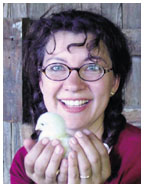|
Web Exclusives: Alumni Spotlight
June 6, 2004: From
the city to the farm Although Wende Elliott ’90 grew up in the Midwest, she never had lived on a farm and knew nothing about raising animals. But that didn’t stop her from leaving the New York business world four years ago for a 120-acre farm in Story County, Iowa. Elliott and her husband, an Iowa native, decided to become organic farmers and devote their lives to what they see as a “noble profession” — running a family farm. Elliott’s company in New York dealt in international logistics, shipping items like scientific equipment and museum pieces, and relocating the households of diplomats and F.B.I. agents. She says she saw her move as an “opportunity to create her own ecosystem,” and to raise her three children with a healthier lifestyle. That idealism was tempered at first by figuring out exactly how to farm, which she learned on the job, raising chickens, turkeys, ducks, and sheep, and spending hours reading and taking an Internet course in agricultural production. Elliott and her husband found it difficult to support themselves — partly because they felt multinational factory farms were squeezing them out, along with other local farmers. Elliott, who majored in anthropology at Princeton, realized something had to be done to help the small farms, so in 2001 she created Wholesome Harvest, a marketing cooperative for family farms producing organic meats and poultry. The co-op has grown to include 41 farms in Iowa, Illinois, Wisconsin, and Minnesota. Organically farmed animals live in pastures instead of in feedlots or confinement buildings, and are fed only certified organic grains. Organic-meat producers, says Elliott, don’t feed their livestock animal by-products, the suspected cause of mad-cow disease. Elliott, who lives in a 19th-century farmhouse she and her husband restored, says that though Wholesome Harvest meats are more expensive, they’re an investment in American farmers who are committed to protecting the welfare of their animals and the integrity of the environment. With a mission statement encouraging participants to “eat
well . . . save the earth . . . and the small farms on it,”
Wholesome Harvest sells its products in supermarkets and through
its Web site, www.wholesomeharvest.com.
By Robin Epstein ’95 Robin Epstein ’95 is a writer in New York.
|
||

